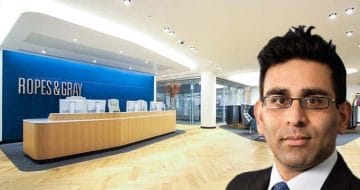Paul de la Peña, tutor at ULaw Moorgate, reflects on his career as an insolvency and restructuring specialist and offers advice to the next gen of solicitors

Paul de la Peña has had a long and varied career in law.
He trained at Wilde Sapte (now Dentons), moving to DLA Piper, and finally Eversheds Sutherland, where he worked for 15 years as a partner and latterly as national head of restructuring. Paul is now a tutor at The University of Law (ULaw), Moorgate, teaching Business Law & Practice and Mergers & Acquisitions on the Legal Practice Course.
During his time at Eversheds Sutherland, a typical day for Paul would involve around 20% of his time spent on management and marketing activities, while the remaining 80% would be spent acting directly for clients. His clients included a diverse mix of lenders and clearing banks, foreign banks and hedge funds. He would also act directly for distressed businesses.
Paul explains that there were two types of work he undertook for clients: advisory matters (helping clients determine “what happens next?”), as well as transactional work (“when it has been decided that there will be a refinance, insolvency, or sale of a distressed asset”).
He tells me he fell into insolvency and restructuring partly due to practicality. There were more jobs in this area in the 1990s when Paul qualified, but on reflection this was the “right choice”, thanks in part to the diverse array of clients “with different business objectives and targets”. A varied skillset and the ability to advise on the transactional and litigious nature of a case is important for any future insolvency and restructuring lawyer, he adds.

Career highlights include the insolvency of British car manufacturers MG Rover and the restructuring of Southern Cross healthcare group. Both matters had wide-reaching public implications for “customers, counterparties, government, the economy, and shareholders”, Paul says. In contrast, difficult times in Paul’s career include the banking crisis in 2008 which led to job losses across the legal profession.
Paul speaks positively about how he was always interested in “training and mentoring internally with trainees and externally with clients”. Upon deciding to leave private practice, it was a natural choice for the former lawyer to start a new career as a tutor at ULaw.
With the Solicitors Qualifying Exam (SQE) coming into force next September, Paul is working hard to design a new course to ensure students are equipped with the knowledge to successfully navigate the new route to solicitor qualification. Part one of the SQE1 — which tests candidates’ functioning legal knowledge in two exams consisting of 180 multiple-choice questions each — presents a fresh challenge for law schools and law students alike, according to Paul. He envisages that to prepare students for this type of exam, learning and revision methods will need to adapt. There will be a greater focus on “using technology and learning analytics so that students can track their progress”, he adds.
For those looking to pursue a career in law, Paul offers the following piece of advice:
“Students must understand that a career doesn’t necessarily last two to five years. They need to think about the long-term and not short-term success.”
On any career regrets, Paul explains how he would have “loved to work in another jurisdiction”. While he did plenty of international work in the UK, Paul was never based abroad, and advises aspiring lawyers to seize the opportunity if it comes their way. It will pay dividends in developing a skillset to becoming a stronger lawyer, he says. Students should have a long-term perspective when planning their legal careers and to make the most of the opportunities available to them.
Paul de la Peña will be speaking at ‘The Big Commercial Awareness Themes of 2020-21’, a virtual student event taking place today afternoon (Monday 23 November) with lawyers from Baker McKenzie, BCLP and Ropes & Gray. The event is fully booked.
About Legal Cheek Careers posts.


